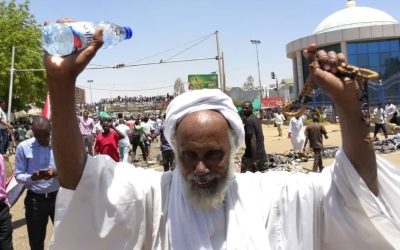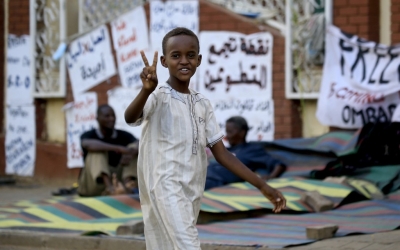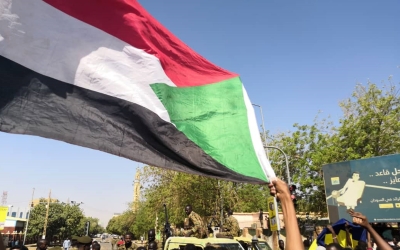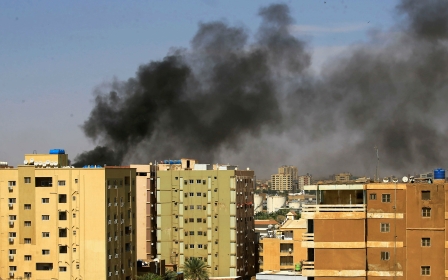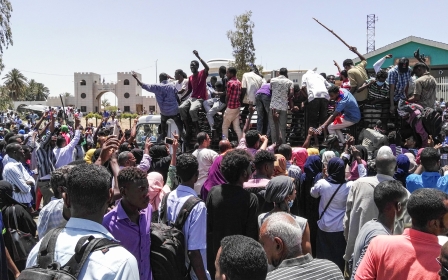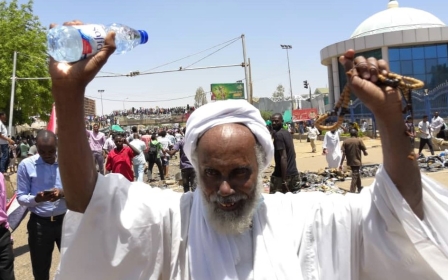Soldiers killed alongside protesters in Sudan crackdown, activists say
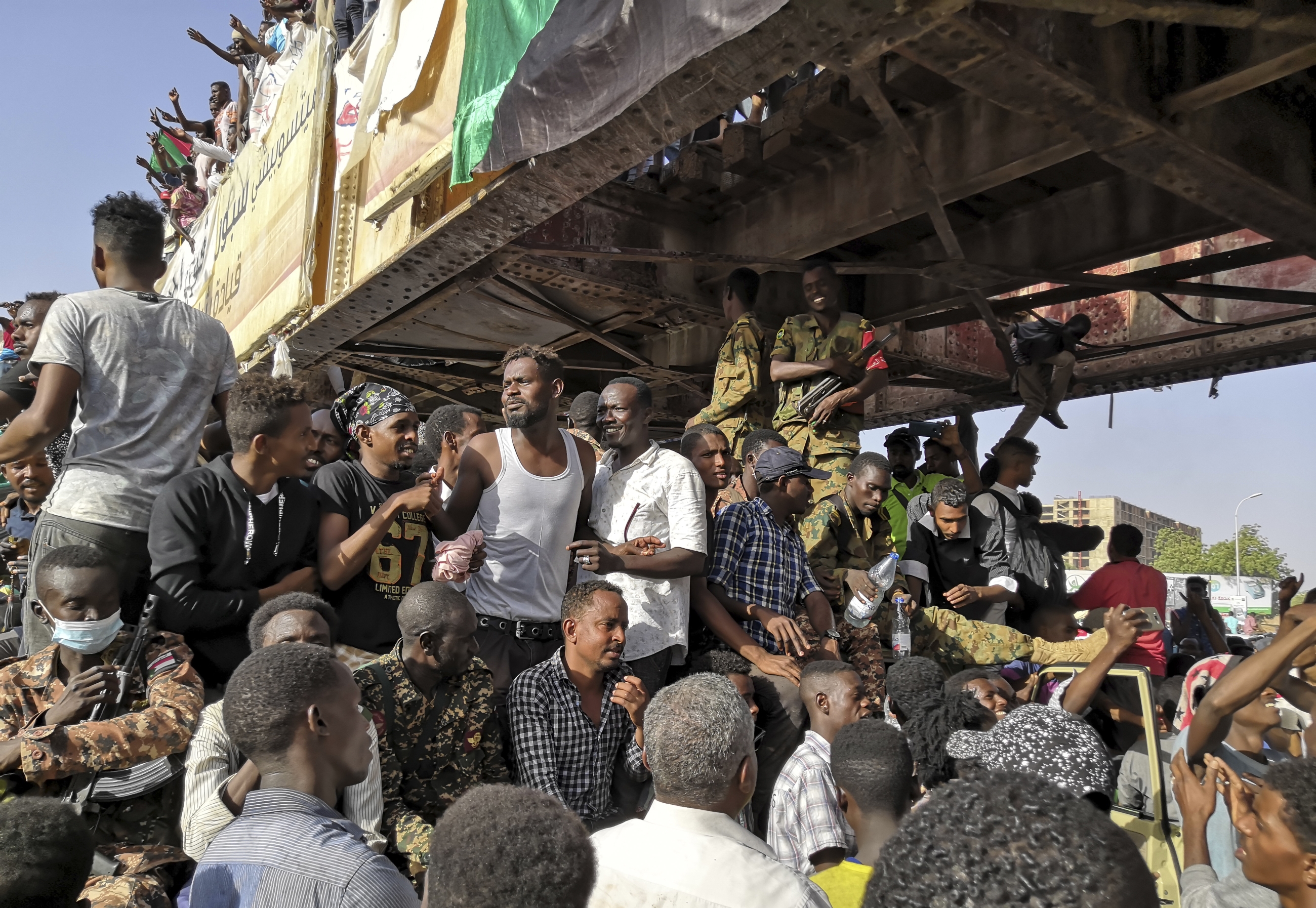
At least five Sudanese soldiers have been killed since the army intervened to protect protesters from security forces and militia units loyal to President Omar al-Bashir, opposition activists said on Tuesday.
In a statement, the Central Committee of Sudanese Doctors said that the soldiers were among 21 people killed by suspected militia fighters outside the army’s headquarters in Khartoum, where protesters have been gathered for the past three days.
Abdul Hamid, an eyewitness, told Middle East Eye that government and ruling party militia units had attacked the protesters from different directions using live bullets and tear gas.
He said the fighters appeared to be driving vehicles belonging to the government’s Rapid Support Forces, a paramilitary unit which has been deployed against rebel groups in Darfur and also acts as a border patrol force.
“Some of them were dressed in ordinary clothes,” said Hamid.
"We were not sure which specific units they belonged to, but in general they are loyal to the ruling party and the security forces which support the inner circle around Bashir.”
Witnesses spoken to by the AFP news agency blamed members of the National Intelligence and Security Service (NISS) and riot police for the attack, and said soldiers had subsequently fired shots in the air in response.
Sudanese opposition groups accused the government of intentionally trying to drag the country into chaos in order to justify continued repression against the protesters whose demands for Bashir to quit have grown louder since anti-government demonstrations began in December.
Why are Sudanese protesting against their government?
+ Show - HideSudanese protests have evolved in the space of less than six months from complaints about bread prices to calls for long-term leader Omar al-Bashir to go and demands for a civilian-led transition to democracy.
Here's a summary of the key moments so far since the protests began.
19 December 2018: People take to the streets in the city of Atbara to protest against a government decision to triple the price of bread, torching a local ruling party office. By the next day protesters on the streets of Khartoum and other cities calling for "freedom, peace, justice". Police try to disperse the crowds, resulting in at least eight deaths. Dozens more will be killed in the weeks of protest that follow
22 February 2019: Sudanese President Omar al-Bashir declares a nationwide state of emergency. He swears in a new prime minister two days later, as riot police confront hundreds of protesters calling for him to resign
6 April: Thousands gather outside the army's headquarters in Khartoum, chanting "one army, one people" in a plea for the military's support. They defy attempts by state security forces to dislodge them and troops intervene to protect them
11 April: Military authorities announce they have removed Bashir and that a transitional military council will govern for two years. Despite celebrations at Bashir's demise, protest leaders denounce the move as a "coup" and the protesters remain camped outside army headquarters.
14 April: Protest leaders call on the military council to transfer power to a civilian government
20 April: Sudan's military rulers hold a first round of talks with protest leaders
27 April: The two sides agree to establish a joint civilian-military ruling council, but talks stall over differences in the composition of the council, with both sides demanding a a majority
15 May: With negotiators reported to be close to agreeing a three-year transition to civilian rule, military leaders suspend talks and insist protesters remove barricades outside the army's headquarters. Talks resume on 19 May but break down again on 20 May, with the opposition insistent that a civilian must head the transitional governing body
28 May: Thousands of workers begin a two-day strike to pressure the military rulers and call for civilian government
3 June: At least 35 people killed and hundreds injured, according to opposition-aligned doctors, as security forces firing live ammunition move to disperse the protest camp outside army headquarters
4 June: General Abdel Fattah al-Burhan, the head of the military council, announces that all previous agreements with protest leaders are scrapped and says elections will be held in nine months
Omer Al-Digair, the head of the opposition Congress Party (SCP), told MEE: “We will never allow that to happen. In the end, it is the regime who is responsible for whatever bad consequences happen as it is the only side that controls the power and owns the weapons.”
In a statement on Tuesday, the Sudanese Professionals Association, one of the main groups behind the protests, accused Bashir’s National Congress Party (NCP) of responsibility for the latest killings, which it said were part of efforts by the National Islamic Front faction within the party to buttress its three-decade rule.
Several activists spoken to by MEE suggested that the NCP leadership had given a “green light” for the latest violence by loyalist security forces, and had also approved arming party members to join militia units.
'Shadow troops'
Ali Osman Mohamed Taha, Sudan’s former ex-first vice president, said in January that the Islamic Front had established units of “shadow troops” to defend the NCP’s rule.
The Islamic Front also trained thousands of fighters who made up the Popular Defence Forces (PDF), a reserve force which was also deployed against rebels in Darfur and in South Sudan prior to its gaining independence in 2011.
Opposition leader Sadiq al-Mahdi, a former prime minister, on Tuesday called on the government to step back from violence and for the army to oust Bashir and oversee a transition of power to the opposition “Change and Freedom” alliance and the SPA.
Both the NCP and the army’s leadership have denied that Bashir intends to step down, and say they will support him until scheduled elections in 2020.
“We don’t see the seriousness of the situation as requiring the stepping down of the president,” Mohamed Al-Hassan Alamin, political secretary of the NCP’s consultative council, told MEE.
Alamin also denied that the ruling party was using its own militia units against the protesters, and said the government had only deployed regular security forces.
International pressure on the government in Khartoum continued to grow on Tuesday with the US, the UK, and Norway calling on the Sudanese authorities to respond to the protesters’ demands for political change in a “serious and credible way”.
The three countries make up the so-called “Troika”, which has acted as the international community’s main intermediary in peace talks between the government in Khartoum and rebel groups in Darfur and other restive regions, as well as in neighbouring South Sudan.
Middle East Eye propose une couverture et une analyse indépendantes et incomparables du Moyen-Orient, de l’Afrique du Nord et d’autres régions du monde. Pour en savoir plus sur la reprise de ce contenu et les frais qui s’appliquent, veuillez remplir ce formulaire [en anglais]. Pour en savoir plus sur MEE, cliquez ici [en anglais].


